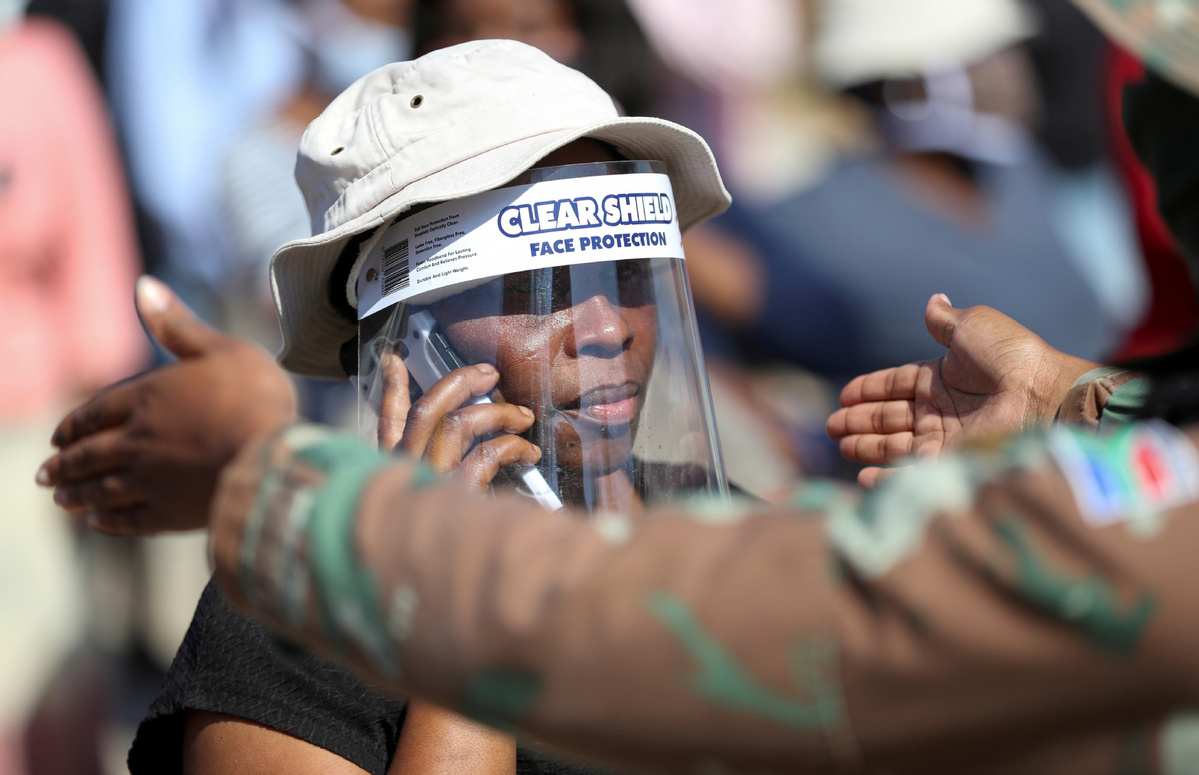
A woman wears a protective face shield during food distribution, as South Africa starts to relax some aspects of a stringent nationwide coronavirus disease (COVID-19) lockdown, in Diepsloot near Johannesburg, South Africa, May 8, 2020. [Photo/Agencies]
Five months since the coronavirus outbreak began in Africa, the impact is clearly visible across the continent, with massive job losses, indefinite closure of businesses and increasing poverty rates.
The worst-hit businesses are those in the education, tourism, hospitality, media, horticulture and transport sectors.
While some businesses were already grappling with various challenges before the advent of coronavirus, the pandemic has worsened the situation, threatening their survival.
Due to movement restrictions imposed by governments as a precautionary measure to curb the spread, for instance, many premier hotels have had no option but to temporarily shutter and send their staff on unpaid leave, while others have had to close permanently.
On Aug 3, the Intercontinental Hotels Corporation Limited announced it's considering permanent closure of its branch in Kenya's capital Nairobi.
In a notice, management informed employees their positions would be declared redundant within 45 days. The hotel opened its doors in Kenya in the late 1960s, and hundreds of jobs would be lost due to the closure.
"We write to inform you Intercontinental Hotels Corporation Limited Kenya is, for operational reasons, considering a permanent closure of Intercontinental Nairobi and winding up its operations in Kenya," the hotel statement read.
The company joins a list of premier hotels hit hard by coronavirus, as Serena Hotels, which operates upscale hotels and resorts in east Africa, southern Africa and southern Asia, having sent its entire staff in Kenya on unpaid leave in June.
Fairmont Hotels and Resorts also closed Fairmont the Norfolk, its branch in Kenya's capital Nairobi, and the Fairmont Mara Safari Club, located in Maasai Mara Game Reserve.
In South Africa, Marriott International permanently shut the doors of three hotels in June, including Mount Grace Country House and Spa in Magaliesburg, the Protea Hotel by Marriott Durban Edward and the Protea Hotel by Marriott Hazyview, attributing the move to the impact of coronavirus.
Due to lack of revenue, many media houses have reduced their staff across the continent. In South Africa, several magazines and newspapers were closed down due to a collapse in circulation.
Media24 closed several of its publications and restructured others, as the coronavirus has led to a decline in advertising revenues.
Associated Media publishing, which publishes Good Housekeeping, Cosmopolitan, Women on Wheels and House and Leisure, also closed down.
Caxton and CTP Publishers and Printers Limited, a publisher and printer of books, magazines and newspapers in South Africa, also closed its magazine division from May, affecting 10 publications.
In Kenya, several leading media houses including Mediamax Networks, Nation Media Group, Royal Media Services and Radio Africa Group, laid off dozens of staff while others were subjected to pay cuts due to decreased advertising revenues.
Nigerian media outlets, including The Punch Newspaper, The Nation and Business Day, also slashed staff salaries or dismissed others due to reduced income.
Private schools have also not been spared by coronavirus-related challenges. The prestigious Bishop Bavin School, a South Africa-based Christian co-ed day and boarding school run by the Anglican Church, closed its doors in June due to financial crisis.
Bedfordview and Edenvale news reported on June 12 that the school's combined deficit totaled to $1.8 million.
Kenya-based private schools have also started to close permanently, with more than 100 schools facing imminent closure due to huge bills occasioned by the coronavirus pandemic, according to the Kenya Private Schools Association.
Peter Ndoro, the chief executive officer of the association, told Citizen TV many private schools will not be able to reopen in January 2021.
He said private schools employ about 150,000 teachers and a similar number of non-teaching staff.
In Uganda, some private schools are also closing, with others opting out of the education business. Najjera Progressive School, for instance, closed permanently by the end of July after 32 years of operation.
School director Andrew Timothy said following a comprehensive analysis of business viability, he was certain the school cannot survive shutdown measures alongside other pre-existing pressures as reported by the Observer.
According to the African Development Bank, Africa may lose 25-30 million jobs in 2020, depending on the level of economic contraction, due to the coronavirus pandemic.
As a result of the coronavirus, the World Food Program estimates the number of food-insecure people in East Africa will increase to more than 41 million people this year, including 14 million who live in urban areas.


